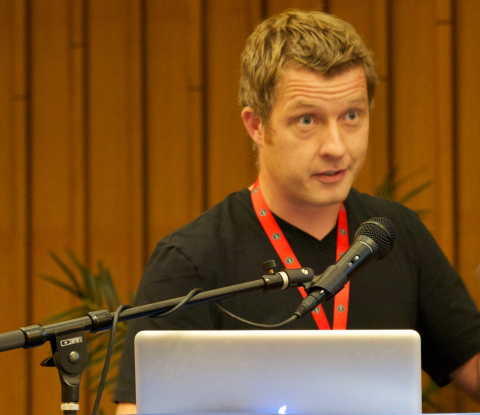CS Researcher John O'Donovan received Best Paper Award for co-authored paper at GlobeCom 2017

Computer Science Researcher Dr. John O'Donovan collaborated with a team led by Dr. Jin-Hee Cho at Army Research Lab, and their paper titled "Modeling and Analysis of Uncertainty-based False Information Propagation in Social Networks," has recently received the GLOBECOM 2017 Best Paper Award in the Selected Areas in the Communications symposium track in Singapore this week. The paper was authored by Cho, Trevor Cook, also of ARL; Scott Rager, Raytheon BBN Technologies; John O'Donovan, University of California, Santa Barbara; and Sibel Adali, Rensselaer Polytechnic Institute.
Specifically, the paper addressed ARL research into developing a human agent's opinion model that can make decisions by aggregating evidence under uncertainty where the human agent's thought process is affected by his/her prior belief and like-minded nature. Cho said the Army is looking to model and analyze a human agent's opinion and opinion update model under uncertainty, derived from a lack of information or conflicting information, and to identify the key factors affecting the significant mitigation or removal of false information in a human agent's opinion model.
The significant lack of understanding in formulating a human opinion with uncertain, incomplete, or conflicting evidence presents a fundamental research challenge, Cho said, a computer scientist.
The research looked at unbiased prior belief or disbelief can help enhance decision performance under conflicting evidence. She said a small fraction of agents propagating true information with unbiased prior belief, as disbelief in false information, can significantly help mitigate false information propagation. "A larger number of true information propagators is more effective than the higher frequency of true information propagation. But even a small fraction of true information propagators can effectively introduce the removal of false information; for example, two-percent of true information propagators can lead about 80-percent of people in a network to make right decisions when people in the network are at least unbiased for false information."
This work is done in collaboration with the Network Science Collaborative Technology Alliance researchers where Cho is the leading author. This work is also the part of Cho's fiscal 2017 Basic Refresh Project on "Uncertainty Management for Decision Making" investigating conflicting evidence and its impact on the level of uncertainty in Subjective Logic. Her work supports the Army chief of staff's modernization priority to develop an Army Network with hardware, software, and infrastructure - sufficiently mobile and expeditionary - that can be used to fight cohesively in any environment where the electromagnetic spectrum is denied or degraded.
The GLOBECOM 2017 conference theme is "Global Hub: Connecting East and West," and according to its website, is dedicated to driving innovation in nearly every aspect of communications. Each year, more than 2,900 scientific researchers and their management submit proposals for program sessions to be held at the annual conference.
(Article Source: ARL Public Affairs)